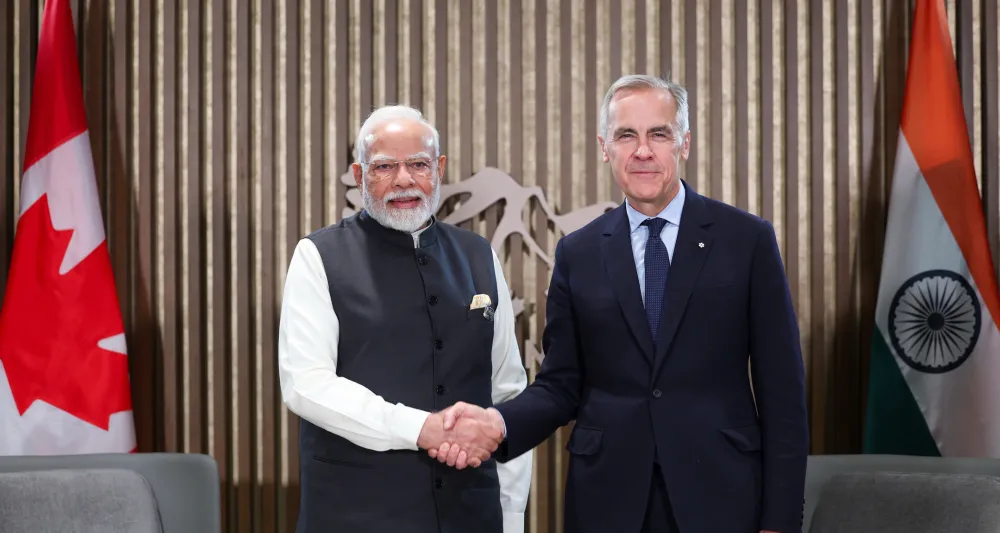Canada Rejects More Than Half Applications from Indian Students Amid ‘Progress’ in Ties with New Delhi

Despite repeated assurances of diplomatic “progress,” Canada’s recent actions tell a very different story. In August 2025 alone, the Canadian government rejected nearly 74% of all study permit applications from Indian students — a staggering figure that underscores a widening gap between Ottawa’s rhetoric and its immigration reality.
According to fresh immigration data obtained by Reuters, only about one in four Indian students were approved for study permits this August. The Indian embassy in Canada has acknowledged this alarming trend, emphasizing that while it is aware of the growing rejections, the final authority to issue or deny permits lies solely with the Canadian government.
This surge in rejections comes amid Canada’s sweeping overhaul of its immigration and student visa regulations — a tightening that follows years of record-breaking international enrollment. Yet even with stricter policies, India remains Canada’s largest source of international students, proving how deeply interwoven the two nations’ educational ties have become.
Declining Numbers and Growing Disillusionment
In August 2023, more than 20,900 Indians had applied for study permits — over a quarter of all global applicants. Fast forward to August 2025, and that number plummeted to just 4,515. This sharp decline signals a shift in perception: Indian students are beginning to question whether Canada remains a trustworthy and welcoming education destination.
The ripple effects are already visible. Prestigious universities such as the University of Waterloo, University of Regina, and University of Saskatchewan have all reported noticeable drops in Indian student enrollments this academic year. Classrooms once buzzing with diverse voices now tell a quieter story — one of hesitation and heartbreak.
Meanwhile, the contrast is striking: Chinese applicants faced a rejection rate of just 24% during the same period. This disparity has sparked an uncomfortable question — are Indian students being unfairly scrutinized under Ottawa’s evolving immigration lens?
Shifting Diplomatic Tone Under Mark Carney
When Mark Carney replaced Justin Trudeau as Prime Minister, many hoped the leadership change would reset strained India–Canada ties. Carney’s early remarks painted a picture of optimism, describing relations with New Delhi as being on a “positive trajectory.”
But the numbers tell another tale. Instead of rebuilding academic trust, Ottawa’s restrictive stance has dampened enthusiasm, sending mixed signals and undercutting its own promises of renewed cooperation. For many hopeful students, the message feels clear — Canada’s doors are open, but only halfway.
“Show Where the Money Came From”: The New Visa Hurdle
Experts suggest the rejection wave isn’t just about missing paperwork — it’s about a new layer of financial scrutiny. Michael Pietrocarlo, founder of Border Pass, a Canadian visa consultancy, explains that officers now require applicants to go beyond standard proofs. “It’s no longer enough to show you have the funds,” he said. “You must show where the money came from — that it’s genuine, traceable, and sustainable.”
While this extra caution is justified as a fraud prevention step, critics argue that it’s being applied inconsistently and often disproportionately toward Indian students — who already face one of the world’s toughest visa screening processes.
Thinking of Studying or Moving to Canada?
If you’re planning to study in Canada , explore business opportunities, or settle permanently, it’s crucial to prepare your documentation and financial proofs with precision. At Global Visa Internationals, we offer end-to-end guidance to make your application stronger and stress-free.
- Canada Student Visa – Get expert assistance to improve your approval chances.
- Canada Tourist Visa – Explore Canada confidently with professional support.
- Canada Business Visa – Expand your global footprint through Canadian partnerships.
- Canada PR Visa – Begin your pathway toward permanent residency and settlement.
- Visa Refusal Assistance – Get personalized help to overturn rejections and reapply confidently.
Book your consultation today and take the first step toward a successful Canadian visa journey. Our experts understand the evolving immigration climate — and how to navigate it strategically.
Rising Frustration Among Indian Students
Jaspreet Singh, founder of the International Sikh Students Association, recalls a very different Canada. “When I arrived in 2015, posters everywhere said ‘Study, Work, Stay.’ Canada was proud to welcome talent from around the world,” he said. “Now, even after completing higher studies, many of us are stuck — unable to find stable jobs or secure permanent residency.”
The disillusionment is spreading fast. Thousands of young Indians are now exploring alternatives like the United Kingdom, Australia, Germany, and Ireland — destinations where visa policies are clearer, post-study work options are stronger, and government promises still match reality.
A Mirror to Canada’s Double Standards
While Canada continues to market itself as a beacon of multiculturalism and academic excellence, its treatment of Indian applicants tells a different tale. Ottawa’s aggressive tightening of study permits — especially from a country that contributes billions to its education economy — raises serious concerns about whether political optics are outweighing common sense.
The stakes are high. In 2023 alone, Indian students contributed an estimated C$10 billion to the Canadian economy through tuition, housing, and local spending. Losing that relationship would not just be a diplomatic setback — it would be an economic one.
If Canada truly hopes to “restore” trust with India, it must move beyond press releases and adopt policies that reflect fairness, transparency, and genuine partnership.
Conclusion
The 74% rejection rate is more than a statistic — it’s a symbol of broken confidence. Unless Ottawa reconsiders its course, Canada risks alienating an entire generation of Indian scholars and professionals who once saw it as the land of opportunity. The world is watching, and so are the students whose dreams now hang in bureaucratic balance.
Free Visa Assessment
Get a personalized consultation within 24 hours